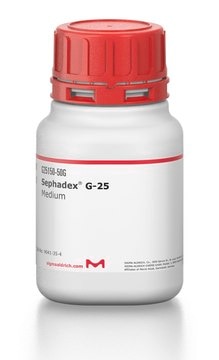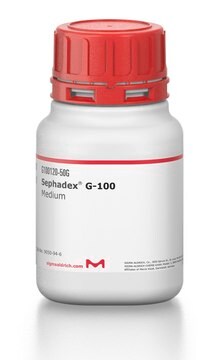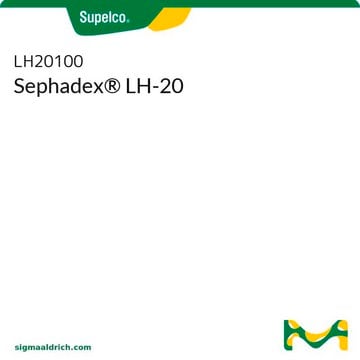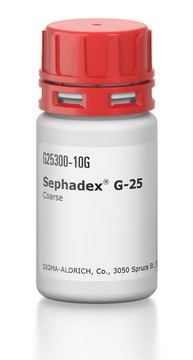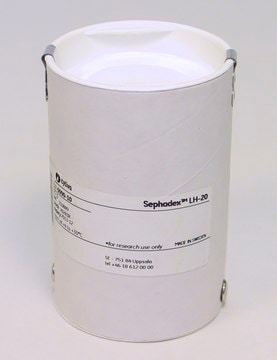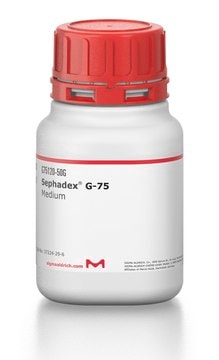G10120
Sephadex® G-10
Medium
Synonym(s):
Gel filtration resin, Sephadex G-10 Medium
Sign Into View Organizational & Contract Pricing
All Photos(2)
About This Item
Recommended Products
technique(s)
protein array: suitable
matrix active group
phase
swelling
1 g swells to 2-3 mL
application(s)
life science and biopharma
compatibility
Cytiva
Looking for similar products? Visit Product Comparison Guide
Related Categories
General description
Sephadex G-10 is a well-established gel filtration resin specifically designed for desalting and buffer exchange of peptides and small biomolecules. It boasts the smallest exclusion limit within the Sephadex range, making it highly effective in these applications. Sephadex itself is a gel filtration resin that is created through the crosslinking of dextran with epichlorohydrin. The various types of Sephadex exhibit different degrees of cross-linking, leading to variations in swelling properties and molecular fractionation range. Sephadex G-10 falls into the category of G-types, alongside four other types, ranging from G-10 for small molecules to G-75 for larger molecules.
Application
Sephadex® G-10 has been used as a size exclusion material for the separation of the conjugated N-glycans from the surplus dye. It has also been used in desalting for reducing salt concentration for anion-exchange (AEx), cation-exchange (CEx) chromatography.
Sephadex® G-10 has been used for the reconstitution of membrane proteins into a giant proteoliposome.
Biochem/physiol Actions
Sephadex G-10 serves as a gel filtration medium for gel filtration chromatography and protein chromatography. Its versatility is demonstrated by its applications in cancer studies and its ability to determine fluoride levels in diverse samples, including tap water, river water, and green tea samples.
Features and Benefits
- Desalts, removes contaminants, and transfers to a new buffer in one step.
- Suitable for buffer exchange and cleanup of biological samples,
- Effective for peptides, small proteins, and oligosaccharides with a molecular weight larger than 700.
- Efficiently removes salts, dyes, and radioactive labels.
- Lowest exclusion limit of 700 molecular weight in the Sephadex G-range
Legal Information
Sephadex is a registered trademark of Cytiva
comparable product
Storage Class Code
11 - Combustible Solids
WGK
WGK 3
Flash Point(F)
Not applicable
Flash Point(C)
Not applicable
Personal Protective Equipment
dust mask type N95 (US), Eyeshields, Gloves
Certificates of Analysis (COA)
Search for Certificates of Analysis (COA) by entering the products Lot/Batch Number. Lot and Batch Numbers can be found on a product’s label following the words ‘Lot’ or ‘Batch’.
Already Own This Product?
Find documentation for the products that you have recently purchased in the Document Library.
Customers Also Viewed
H Han et al.
Nucleic acids research, 22(14), 2837-2844 (1994-07-25)
Different helical conformations of DNA (D), RNA (R), and DNA.RNA (DR) hybrid double and triple helices have been detected using affinity cleavage analysis. Synthetic methods were developed to attach EDTA.Fe to a single nucleotide on RNA as well as DNA
M Muirhead et al.
International journal of cell cloning, 8(6), 392-408 (1990-11-01)
We have cloned a stromal cell from mouse bone marrow selected on the basis of its ability to promote the growth of an Abelson virus-transformed pre-B cell line. These stromal cells have smooth muscle features, and the ultrafiltrate of stromal
Kwang Wook Hyun et al.
Peptides, 27(6), 1173-1178 (2005-11-18)
This study describes the extraction and characterization of a platelet aggregation inhibitory peptide from Inonotus obliquus. Ethanol extract from I. obliquus ASI 74006 mycelia showed the highest platelet aggregation inhibitory activity (81.2%). The maximum platelet aggregation inhibitory activity was found
Kaushal Rege et al.
Nature protocols, 5(3), 408-417 (2010-03-06)
Methods development in chromatography is a time-consuming, trial-and-error process that requires laborious experimentation. We describe a high-throughput screening (HTS) protocol for the rapid identification of chromatographic steps for protein purification from cell-free expression broths. Broths containing the protein are loaded
N-glycan analysis by CGE-LIF: profiling influenza A virus hemagglutinin N-glycosylation during vaccine production
Schwarzer J, et al.
Electrophoresis (2008)
Our team of scientists has experience in all areas of research including Life Science, Material Science, Chemical Synthesis, Chromatography, Analytical and many others.
Contact Technical Service

